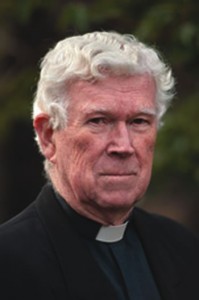TALKING ABOUT SPIRITUALITY TODAY
4. Christian Spirituality and the Trinity
In the last article, we explored spirituality in relation to the Christian mystery. We saw that it is a deepening friendship – with the Father, through the Son, in the Spirit. The spiritual quest is one driven by God’s gift of himself. Jesus wants to “share his joy…to the full” (John 17: 13).
But another aspect of this is found in Jesus’ words: the “we” of God will “make our home” in those who so love Jesus they “will keep my word.” (John 14: 23). This article hopes to explore the we of God, namely the life of the Trinity in living a Christian spirituality.
Watching our Language
Over twenty years ago, Pope Benedict XVI, as the theologian Joseph Ratzinger, wrote an important article about being a person. The essential point he made is this. If you ask someone “who are you?” they will say “I am Mary Jones” or “Bill Smith.” So being a “person” is to do with being an individual, having an identity that is singular and unique. We know that we also are embodied beings with rational capacities that distinguish us from the rest of the animal world.
But if that question “who are you?” is put to Jesus, his answer would be “I am from the Father”, that “I can do nothing of myself”, that “I am in the Father and the Father is in me.” This is at the heart of John’s Gospel.
Jesus’ sense of his identity, as the Word in the Trinity and as the Word made Flesh, is that his sense of himself, of being unique, is not as a free-standing singular being. His identity is something given. That is what makes him unique. He can only be the Word because he is uttered from within, in a relationship, namely He is from the Father as the perfect likeness and is to the Father in expressing that likeness.
So God has revealed that, at the heart of God’s life, we find persons-in-relationship. Human images have been used to capture this, for instance, Lover/Beloved/Love; Father, Son and Spirit.
Michael Downey suggests that perhaps the best language to capture the mystery of the three persons (Trinity) as one God is not through nouns (as above) or propositions (theology trying to explain God). It is through those very small words we call prepositions – from, to, with, in. These are the words Jesus uses in trying to convey who He is and his life with the Father and the Spirit.
Hence, being a person, measured against God as a benchmark, is not primarily about being an individual. It is about being-in-relationship. From birth to death, each of us is a self from relationship and called to grow in relationship. Our lives (and creation itself) are made up of a network of relationships. 

This is the most basic way in which we are images of God. The other form of being in God’s image – our rational capacity to know and love in freedom – is meant to be at the service of our relational make-up.
The God of the Covenant – a Fresh Perspective
So in the light of what we have been saying, the Hebrew understanding of God in terms of the Covenant makes much more sense. Their experience is of a God who is always there for and with his people. This is God who is always faithful, the God of the promise. This is a God who is always turned towards us.
This is the God who offers, and yearns for, intimacy. God is drawn to the needy -the ‘poor in spirit’ (those who admit their need for God) and especially to those who are most vulnerable –the widow, orphan and stranger.
But this is also a God who is vulnerable to rejection. Patrick O’Sullivan’s words are appropriate here:
“When vulnerability meets power, the result is alienation; but when vulnerability is met by vulnerability, the result is intimacy. The only way into intimacy is through vulnerability.”
The fullest divine expression of this is embodied in the crucified Lord, the high priest who is compassionate precisely because “he lives too in the limitations of weakness” (Heb. 5: 2). But, as Paul is glad to ‘boast’ of his weakness,”that the power of Christ may rest on him”, so his Master experienced the power of his Father’s love as the crucified and risen Lord.
We are called to share in this pattern as the expression in history of the inner life of God – endless self-giving love. It is what we call sharing in the Paschal mystery. It is done within the context of the Church community, nourished by word and sacrament, with the summit and source found in the self-gift of Jesus for us and to us in the Eucharist. This is the very heart of Christian spirituality.
Christian Spirituality as Identification & Transformation
We have seen that Jesus wants to share friendship with us. But he also calls us to be his ‘disciples’ – to follow him. The spiritual tradition often speaks of ‘the imitation of Christ’ – as in the well-known book. This highlights something from our human experience.
We need models or exemplars to show us how to live, people who inspire us to be like them. This underlines the need to looking to external people or ideals as a way of showing us by example how we can slowly be transformed. It is process from the outside-in, the way of imitation. It also tends to put the emphasis in the spiritual quest on our own efforts.
But there is also the aspect of identification. Here the accent is on something shared, namely, a life. The source of someone’s identity comes from within. The process of being transformed (‘putting on the mind of Christ) is one from the inside-out. This puts more emphasis on the action of God – the Holy Spirit at work with the Father and the Son who have ‘made their home’ in us.
Through Baptism, then, we share a common life with and in God through Jesus. This means that we share in the knowing, loving, judging, willing, rejoicing of the Trinity. We are gradually transformed from inside-out by the action of the Spirit especially through the Gifts. The outcome is manifest in the Fruits of the Spirit (Gal. 5). 
Transformation
Our deepest identity, then, is shaped by God. The Spirit forms not only how we perceive and understand God, life, others and all reality. The Spirit guides how we are disposed to be affected and responsive in our various relationships, especially to what fosters or opposes what is truly good. The Spirit leads us into a deeper and more inclusive love.
Conclusion: A Beautiful Image
In her writings, Thérèse of Lisieux, at times, refers to the Trinity in terms of the ‘fire’ or ‘furnace’ of divine love. She uses this language when she wants to convey her longing to be with God, the desire for heaven. The English translation does not quite capture the original word in French. Thérèse uses the word ‘foyer.’ This can mean, as in English, an entrance area, a vestibule in a house or office. In French, it is also used to denote the domestic hearth.
For Thérèse, ‘foyer’ evoked a glowing domestic hearth or fireplace with all the family gathered around it. Imagine the scene: a cold winter evening, people making toast over the open fire, sipping hot soup, savouring the mulled wine - the play of light and shade from the flames on the surrounding faces. Think of the rich associations: warmth, security, peace, nourishment, joy and, most important of all, the sense of belonging.
Visitors arrive. There is a warm welcome. They are given soup and toast. There is shuffling to make room for the guests.
This is the God of the Trinity’s family – where there is always space for another, and another, and another…. and, in fact, for all of creation.
***************
Suggestions for Reflection and Discussion
What do you think of understanding the Trinity and being a person in terms of ‘prepositions’?
Do you think we can tend to forget that the Holy Spirit is quietly at work in our hearts and our lives all the time – and that it does not ultimately depend on us?
Take some time to ponder Chapter 14 of John’s Gospel. How often does see himself in terms of the ‘prepositions’ we talked about?
Next Month: Retrieving the Biblical view of the human person – a helpful approach?
Sources:
Michael Downey, Altogether Gift: A Trinitarian Spirituality
Patrick O’Sullivan, SJ ‘Sure beats selling Cardigans’: Fostering our Relationship with God.


 Entries(RSS)
Entries(RSS)